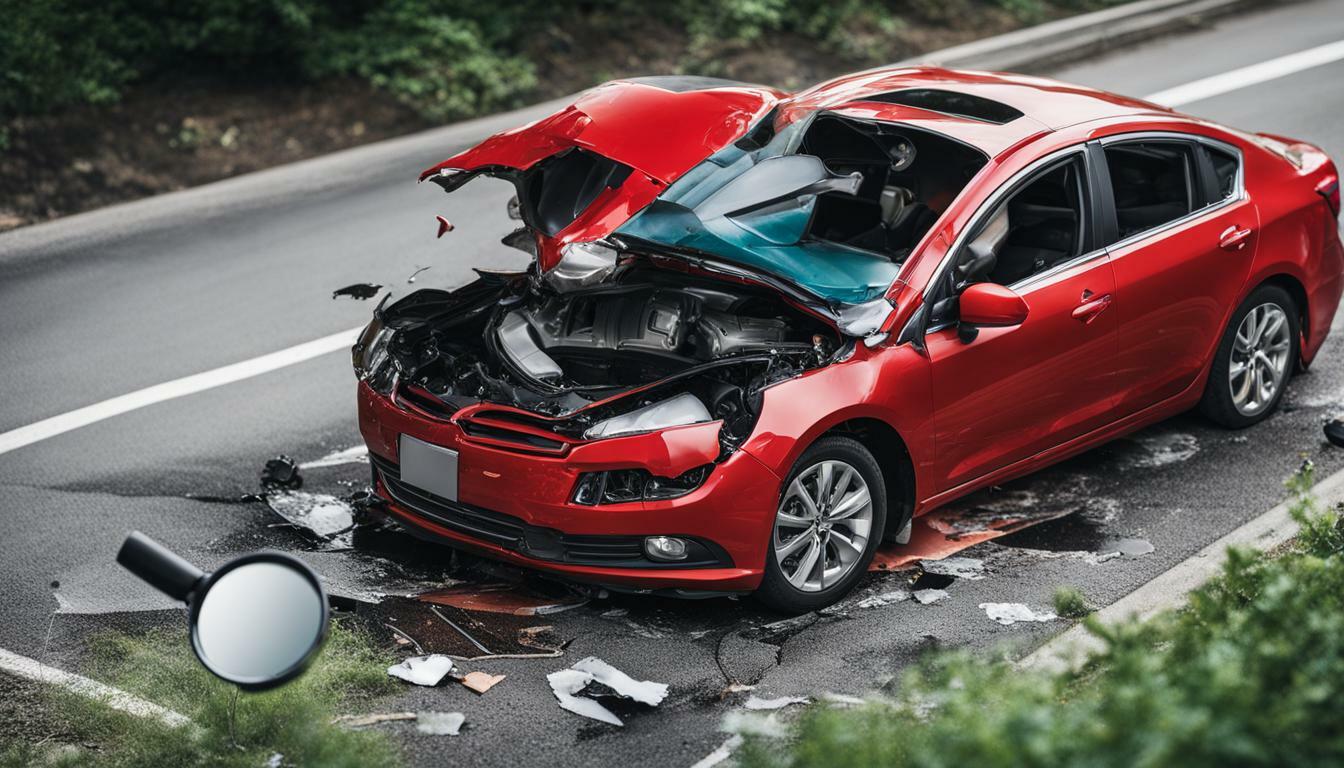When it comes to car insurance, there’s more to consider than just collision coverage. Comprehensive car insurance, also known as “other than collision” coverage, provides protection against incidents that are not a collision. It helps cover the cost of repairing or replacing your vehicle in cases of theft, glass breakage, or acts of nature like storms.
Comprehensive coverage differs from collision coverage, which pays for repairs to your own vehicle in an at-fault accident. With comprehensive coverage, you’ll be covered for damage caused by accidents with animals, glass breakage, or acts of nature. It’s important to note that liability-only car insurance only covers the costs for injuries or property damage to the other party in an at-fault accident, not your own vehicle.
While comprehensive coverage is not legally required, it may be necessary if you are leasing or financing your vehicle, as lenders often require it. Before making a decision, it’s crucial to carefully consider your coverage needs and consult with an insurance professional who can provide personalized advice based on your specific circumstances.
Key Takeaways:
- Comprehensive car insurance provides coverage for incidents other than collision, such as theft, glass breakage, and acts of nature.
- It differs from collision coverage, which pays for repairs to your own vehicle in at-fault accidents.
- Liability-only car insurance only covers injuries or property damage to the other party, not your own vehicle.
- Comprehensive coverage may be required by lenders if you are leasing or financing your vehicle.
- Consulting with an insurance professional is essential to ensure you have the right coverage for your specific needs.
Understanding Comprehensive Car Insurance
Comprehensive car insurance, also known as “other than collision” coverage, offers protection for a range of incidents beyond just crashes. This type of insurance is designed to provide financial assistance in repairing or replacing your vehicle in situations such as theft, glass breakage, or damage caused by natural disasters like storms. In essence, comprehensive coverage ensures that you are covered for non-accidental damages, giving you peace of mind on the road.
When considering car insurance, it’s important to understand the differences between comprehensive coverage and collision coverage. While collision coverage pays for repairs to your own vehicle in an at-fault accident, comprehensive coverage takes care of damages caused by accidents with animals, glass breakage, or acts of nature. It’s worth noting that comprehensive coverage is not legally required, but some lenders may require it if you are leasing or financing your vehicle.
Before making a decision on your car insurance coverage, it’s essential to carefully consider your needs and consult with an insurance professional. They can provide valuable guidance based on your individual circumstances and help you determine the best level of coverage for your situation. Taking the time to review your options and understand the benefits of comprehensive car insurance can ensure that you have the right protection for your vehicle.
In conclusion, comprehensive car insurance, also known as “other than collision” coverage, provides coverage for incidents beyond just crashes. It helps protect your vehicle from theft, glass breakage, and damage caused by acts of nature. While not legally required, comprehensive coverage is an important consideration, especially if you are leasing or financing your vehicle. By carefully evaluating your coverage needs and consulting with professionals, you can make informed decisions and ensure that you have the right car insurance to safeguard your vehicle against non-accidental damages.
Making Informed Decisions
When it comes to car insurance, it’s crucial to make informed decisions that take into account the potential risks and individual needs. Comprehensive coverage for car insurance, also known as “other than collision” coverage, offers a wide range of protection against non-collision events. Understanding the benefits of comprehensive coverage and evaluating your coverage options are key steps in ensuring you have the right protection for your vehicle.
Comprehensive car insurance provides all-inclusive auto insurance that goes beyond collision coverage. It protects your vehicle against incidents such as theft, glass breakage, and acts of nature, including storms. By having comprehensive coverage, you can rest easy knowing that you are financially protected in case of non-accidental damages. This type of coverage is particularly important if you are leasing or financing your vehicle, as lenders may require comprehensive insurance to protect their investment.
When considering comprehensive car insurance, it’s essential to assess your individual needs. Factors such as your location, driving habits, and the value of your vehicle should all be taken into account. Consulting with an insurance professional can help you understand the specific benefits and limitations of comprehensive coverage. They can guide you in choosing the level of coverage that best suits your needs and budget.
Table: Key Considerations for Comprehensive Car Insurance
| Factors | Considerations |
|---|---|
| Location | Do you live in an area prone to theft or natural disasters? |
| Driving Habits | Do you frequently drive in areas with high wildlife populations? |
| Vehicle Value | Is your vehicle expensive to repair or replace? |
In conclusion, comprehensive coverage for car insurance provides valuable protection against non-collision events that can damage your vehicle. By making informed decisions and carefully evaluating your coverage options, you can ensure that you have all-inclusive auto insurance that meets your specific needs. Don’t hesitate to consult with an insurance professional who can guide you through the process and help you choose the right level of coverage. Remember, it’s better to be prepared and have comprehensive coverage than to be caught off guard by unexpected expenses.
Conclusion
Understanding car insurance other than collision is essential for protecting your vehicle from non-collision incidents. Comprehensive car insurance, also known as “other than collision” coverage, is a type of insurance that helps cover the cost of repairing or replacing your vehicle in incidents that are not a collision. This coverage is especially important for damages caused by theft, glass breakage, or acts of nature, such as storms. While comprehensive coverage is often purchased together with collision coverage, it is crucial to comprehend the differences between the two.
Collision coverage focuses on repairs to your own vehicle in an at-fault accident, while comprehensive coverage steps in to cover damage caused by accidents involving animals, glass breakage, or acts of nature. On the other hand, liability-only car insurance covers the costs for injuries or property damage caused to the other party in an at-fault accident. While comprehensive coverage is not a legal requirement, it may be mandatory if you are leasing or financing your vehicle.
To make an informed decision about the right coverage for your specific needs, it is vital to carefully consider your coverage needs and consult with an insurance professional. They can provide guidance on the level of comprehensive coverage that best suits your circumstances. With their expertise, you can ensure that you have the right protection in place to safeguard your vehicle from unexpected incidents beyond collisions.
FAQ
What is comprehensive car insurance?
Comprehensive car insurance, also known as “other than collision” coverage, helps cover the cost of repairing or replacing your vehicle in incidents that are not a collision. It covers damage caused by theft, glass breakage, or acts of nature like storms.
How does comprehensive coverage differ from collision coverage?
Collision coverage pays for repairs to your own vehicle in an at-fault accident, while comprehensive coverage pays for damage caused by accidents with animals, glass breakage, or acts of nature.
Is comprehensive coverage legally required?
Comprehensive coverage is not legally required, but it may be required by lenders if you are leasing or financing your vehicle.
What does liability-only car insurance cover?
Liability-only car insurance covers the costs for injuries or property damage caused to the other party in an at-fault accident.
How can I determine if I need comprehensive coverage?
It is important to carefully consider your coverage needs and consult with an insurance professional before making a decision. Factors to consider include the value of your vehicle, the potential risk of non-collision incidents, and any lender requirements.



